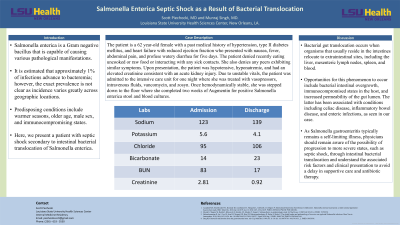Tuesday Poster Session
Category: Small Intestine
P4174 - Salmonella Enterica Septic Shock as a Result of Bacterial Translocation
Tuesday, October 24, 2023
10:30 AM - 4:00 PM PT
Location: Exhibit Hall

Has Audio

Scott R. Piechocki, MD, MS
Louisiana State University Health Sciences Center
New Orleans, LA
Presenting Author(s)
Scott R. Piechocki, MD, MS1, Munraj Singh, MD2
1Louisiana State University Health Sciences Center, New Orleans, LA; 2LSU Health Sciences Center, New Orleans, LA
Introduction: Salmonella enterica is a Gram negative bacillus that is capable of causing various pathological manifestations. It is estimated that approximately 1% of infections advance to bacteremia; however, the exact prevalence is not clear as incidence varies greatly across geographic locations. Predisposing conditions include warmer seasons, older age, male sex, and immunocompromising states. Here, we present a patient with septic shock secondary to intestinal bacterial translocation of Salmonella enterica.
Case Description/Methods: The patient is a 62-year-old female with a past medical history of hypertension, type II diabetes mellitus, and heart failure with reduced ejection fraction who presented with nausea, fever, abdominal pain, and profuse watery diarrhea for five days. The patient denied recently eating undercooked or raw food or interacting with any sick contacts. She also denied any peers exhibiting similar symptoms. Upon presentation, the patient was hypotensive, hyponatremic, and had an elevated creatinine consistent with an acute kidney injury. Due to unstable vitals, the patient was admitted to the intensive care unit where she was treated with vasopressors, intravenous fluids, and broad spectrum antibiotics. Once hemodynamically stable, she was stepped down to the floor where she completed two weeks of Augmentin for positive Salmonella enterica stool and blood cultures.
Discussion: Bacterial gut translocation occurs when organisms that usually reside in the intestines relocate to extraintestinal sites, including the liver, mesenteric lymph nodes, spleen, and blood. Opportunities for this phenomenon to occur include bacterial intestinal overgrowth, immunocompromised states in the host, and increased permeability of the gut lumen. The latter has been associated with conditions including celiac disease, inflammatory bowel disease, and enteric infections, as seen in the case above. As Salmonella gastroenteritis typically remains a self-limiting illness, physicians should remain aware of the possibility of progression to more severe states, such as septic shock, through intestinal bacterial translocation and understand the associated risk factors and clinical presentation to avoid a delay in supportive care and antibiotic therapy.
Disclosures:
Scott R. Piechocki, MD, MS1, Munraj Singh, MD2. P4174 - Salmonella Enterica Septic Shock as a Result of Bacterial Translocation, ACG 2023 Annual Scientific Meeting Abstracts. Vancouver, BC, Canada: American College of Gastroenterology.
1Louisiana State University Health Sciences Center, New Orleans, LA; 2LSU Health Sciences Center, New Orleans, LA
Introduction: Salmonella enterica is a Gram negative bacillus that is capable of causing various pathological manifestations. It is estimated that approximately 1% of infections advance to bacteremia; however, the exact prevalence is not clear as incidence varies greatly across geographic locations. Predisposing conditions include warmer seasons, older age, male sex, and immunocompromising states. Here, we present a patient with septic shock secondary to intestinal bacterial translocation of Salmonella enterica.
Case Description/Methods: The patient is a 62-year-old female with a past medical history of hypertension, type II diabetes mellitus, and heart failure with reduced ejection fraction who presented with nausea, fever, abdominal pain, and profuse watery diarrhea for five days. The patient denied recently eating undercooked or raw food or interacting with any sick contacts. She also denied any peers exhibiting similar symptoms. Upon presentation, the patient was hypotensive, hyponatremic, and had an elevated creatinine consistent with an acute kidney injury. Due to unstable vitals, the patient was admitted to the intensive care unit where she was treated with vasopressors, intravenous fluids, and broad spectrum antibiotics. Once hemodynamically stable, she was stepped down to the floor where she completed two weeks of Augmentin for positive Salmonella enterica stool and blood cultures.
Discussion: Bacterial gut translocation occurs when organisms that usually reside in the intestines relocate to extraintestinal sites, including the liver, mesenteric lymph nodes, spleen, and blood. Opportunities for this phenomenon to occur include bacterial intestinal overgrowth, immunocompromised states in the host, and increased permeability of the gut lumen. The latter has been associated with conditions including celiac disease, inflammatory bowel disease, and enteric infections, as seen in the case above. As Salmonella gastroenteritis typically remains a self-limiting illness, physicians should remain aware of the possibility of progression to more severe states, such as septic shock, through intestinal bacterial translocation and understand the associated risk factors and clinical presentation to avoid a delay in supportive care and antibiotic therapy.
Disclosures:
Scott Piechocki indicated no relevant financial relationships.
Munraj Singh indicated no relevant financial relationships.
Scott R. Piechocki, MD, MS1, Munraj Singh, MD2. P4174 - Salmonella Enterica Septic Shock as a Result of Bacterial Translocation, ACG 2023 Annual Scientific Meeting Abstracts. Vancouver, BC, Canada: American College of Gastroenterology.
